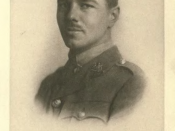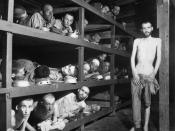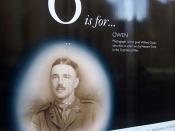Analyse the style and techniques used by two poets to express their feeling about human suffering and their personal and emotional conflicts
"Dulce est Decorum Est" by Wilfred Owen and "The Survivor" by Primo Levi express the personal conflicts the poets experienced during war time. Owen describes one of the many scenes he saw during World War One, where one of his fellow soldiers beside him died in a gas attack. He also focuses on the "old lie" of how sweet it is to die for your country. Levi conveys guilt that he feels after he survived a traumatic experience in Auschwitz in which many others died. Both poets use a series of techniques like similes, metaphors and mood to convey their suffering.
To begin with, Owen and Levi use a mood of sadness, guilt and anger to discuss their emotional problems during war. Owen uses action verbs in the present tense to show the actions of the soldiers.
For example, "In all my dreams, before my helpless sight, He plunges at me, guttering, choking, drowning." These actions give a more realistic image for the reader because the verbs seem like they are taking place now and the reader can imagine the soldier dying. In addition, the word "all" shows that the fact he cannot forget his memory easily. He thinks about it every night.
Levi also uses linguistic techniques to show how mood of guilt and the way it is torturing him. This is showed in the following quotation: "No one died in my place. No one." He feels guilty because his friends died in the concentration camps and he is alive. The repetition of the words "no one" represents the internal battle with himself after he survived from his shocking experience.
Levi tries to describe how he feels...


